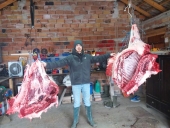








 1
1




Chard Irking wrote:I too am interested in this question. Also, what do folks do with all the water being used? Do you just let it drain on the ground? Seems like it would make a muddy mess quickly. Is it safe to use for irrigating a garden?

 3
3




- Tim's Homestead Journal - Purchase a copy of Building a Better World in Your Backyard - Purchase 6 Decks of Permaculture Cards -
- Purchase 12x Decks of Permaculture Cards - Purchase a copy of the SKIP Book - Purchase 12x copies of Building a Better World in your Backyard
 5
5




First, yes the scalder uses water - it's about 160F so needs to cool before applying to plants and as T. says, it will be full of feathers, blood and shit. I would try to apply that water to a mulch pit near trees if my processing area wasn't so far away from useful trees.Timothy Norton wrote:I might be wrong because I haven't butchered chickens (yet) but isn't the plucker separate from the scalder which has the water in it?
I believe the plucker doesn't utilize water?
Visit Redhawk's soil series: https://permies.com/wiki/redhawk-soil
How permies.com works: https://permies.com/wiki/34193/permies-works-links-threads
 3
3




"When the whole world is running towards a cliff, he who is running in the opposite direction appears to have lost his mind." C.S. Lewis
Visit https://themaineingredient.com for organic, premium dried culinary herbs that are grown, processed, and packaged in the USA.
 3
3




 4
4




Matt McSpadden wrote:My guess - about half a gallon of water per cycle.
Not sure if that helps any since these are all guesses and averages. Sounds like no one has paid attention to the amount of water used :)... and in the desert... that is a very important question.
 7
7




Douglas Alpenstock wrote:In the long long ago, I remember that a plucker was a simple rotating drum with rubber fingers that pulled feathers after scalding. No water was involved. Clue me in - maybe the tech has evolved?
"When the whole world is running towards a cliff, he who is running in the opposite direction appears to have lost his mind." C.S. Lewis
Visit https://themaineingredient.com for organic, premium dried culinary herbs that are grown, processed, and packaged in the USA.

|
I have discovered my inner Beavis through interpretive dance. I learned it from this tiny ad:
Learn Permaculture through a little hard work
https://wheaton-labs.com/bootcamp
|



